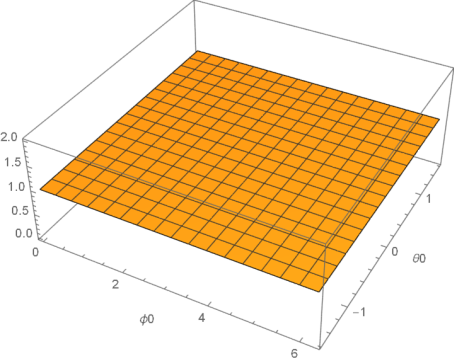The integration Integrate[\[Delta][...]dV about the infinite sphere must evaluate to 1!
Test of your formula doesn't evaluate to one, but for the modified approach
$\delta (r-\text{r0},\theta -\text{$\theta $0},\phi -\text{$\phi $0})=\frac{\csc (\theta ) \tan (\text{$\theta $0}) \delta (\theta -\text{$\theta $0}) \delta (r-\text{r0}) \delta (\phi -\text{$\phi $0})}{r^2} $
the integration gives
sol=Integrate[ DiracDelta[r - r0]/(r^2 Sin[\[Theta]])DiracDelta[\[Phi] - \[Phi]0] DiracDelta[ \[Theta] - \[Theta]0 ]/Cot[\[Theta]0] r^2 Cos[\[Theta]]
, {r, 0,Infinity}, {\[Theta], -Pi/2, Pi/2}, {\[Phi], 0, 2 Pi},
Assumptions -> {r0 > 0, 0 < \[Phi] < 2 Pi, -Pi/2 < \[Theta] < Pi/2,Element[{r0, \[Theta]0, \[Phi]0}, Reals]} ]
(*UnitStep[\[Pi] - 2 \[Theta]0, \[Pi]/2 + \[Theta]0, 2 \[Pi] - \[Phi]0, \[Phi]0]*)
Plot3D[sol, {\[Phi]0, 0, 2 Pi}, {\[Theta]0, -Pi/2, Pi/2},AxesLabel -> {\[Phi]0, \[Theta]0} ]
The result equals 1 for 0 < \[Phi]0 < 2 Pi, -Pi/2 < \[Theta]0 < Pi/2.
addendum/modified
The added integral ep==... contains only scalar argument inside DiracDelta[reDiracDelta["re" - rp]"rp"], only which stands for the Integration alongvectorform of r1DiracDelta (see first part of the question)
It must be substituted by
dirac and= r2DiracDelta[re - rp]/re^2 DiracDelta[\[Phi]e - \[Phi]p] DiracDelta[\[Theta]e - \\[Theta]p]/( Sin[\[Theta]e] Cot[\[Theta]p]) is affected.
It followsKnowing Integrate[...DiracDelta[reDiracDelta[x - rp]y],{rex,0,Infinity}, {rpy,0,Infinity}]= Integrate[... /.rex->rp>y, {rpy,0,Infinity}] the integration can be partially executed. The integral can be divided into three parts
ep=ep = -NIntegrate[Sin[\[Theta]e]NIntegrate[ Sin[\[Theta]p],(re^2*rp^2*intE[re]*intP[rp]*1/re^2)/(a {\[Theta]e,- 0,b*Sqrt[intE[re]*intP[rp]] \[Pi]},+ {\[Theta]p,c*intE[re]*intP[rp]) 0, \[Pi]}/.re -> rp , {\[Phi]erp, 0, 2 \[Pi]\[Infinity]}]*
NIntegrate[1 , {\[Phi]p, 0, 2 \[Pi]}] * ]*
NIntegrate[(re^2*rp^2*intE[re]*intP[rp] )NIntegrate[1/(a -b*Sqrt[intE[re]*intP[rp]]+Sin[\[Theta]e] c*intE[re]*intP[rp]Cot[\[Theta]p])Sin[\[Theta]e] Sin[\[Theta]p] /. re\[Theta]e -> rp \[Theta]p, {rp\[Theta]p, 0- Pi/2, \[Infinity]\[Pi]/2} ]
(*-02.0637158*09081 *)

